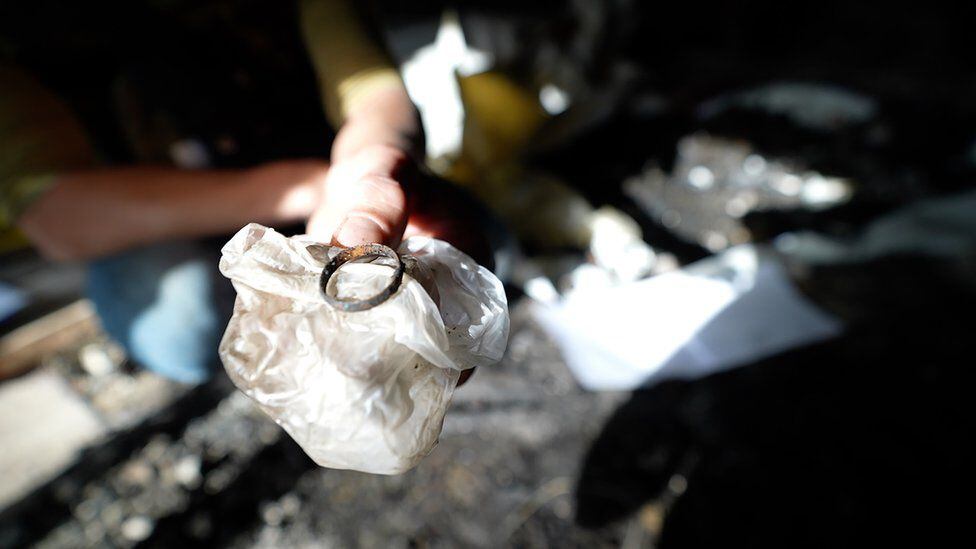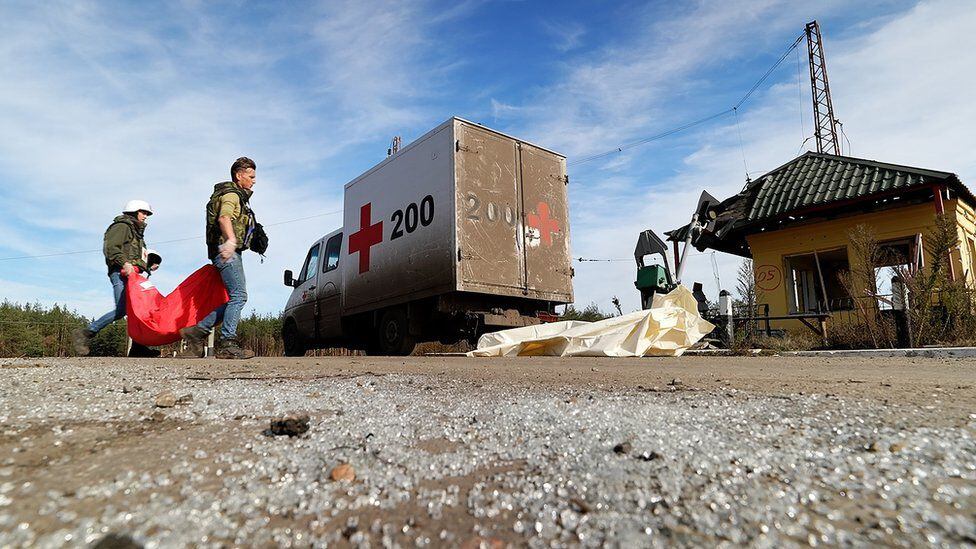This article contains details that some readers may find disturbing.
Artur describes his job as being responsible for bringing the dead back from oblivion.
He and Denys, two young Ukrainians, have the hard task of recovering the bodies of the civilians and soldiers killed in this brutal war. That includes both dead Russians and those on their side.
LOOK: “They are playing with fire”: The IAEA’s dire warning about the attacks on the Zaporizhzhia nuclear plant
On the day we meet them they are in a recently liberated area in eastern Ukraine.
Artur says that his job is to make sure that no corpse is left on the battlefield.
The ground is littered with rubble, there are abandoned trenches and deep shell holes.
They have been told that there are several bodies lying somewhere of this scene of apocalyptic devastation.
In the distance, the sound of battle is still heard.
Artur says that they are well aware that their work is dangerous, but considers that the risks are justified.”because the most important thing is to get the dead out of this terrible war“.
They open the door of their white van, marked with a red cross and the number 200, the military code for transporting dead soldiers.
In doing so a deep smell of death rises in the air and we see maggots in the bodies recovered early that day.
Artur and Denys have been told that there are several bodies in the area, but now they have to find the location.
Denys flies a small drone equipped with a camera to explore the area.
riddled with mines
They are not only looking for the bodies, but also mine signs.
One of your team was recently injured by one. It is a constant danger.
They now take the precaution of throwing a grappling hook to flip a corpse before approaching the wreckage.
It is known that Russian forces they place booby traps in buildings and even bodies before retiring.
The day before, a Ukrainian military engineer told me that he believes there is about 100,000 mines in the areas recently liberated from eastern Ukraine.
It will take a long time to disable them.
The engineer says that, as a general rule, one year of war is equivalent to five years of clearing mines.

After flying the drone for around 20 minutes, Artur and Denys believe they have identified a probable location.
It is a bombed building next to a train track that has been destroyed.
They put on their helmets and bulletproof vests and move carefully through the rubble.
Inside the collapsed structure they find the charred remains of three bodies.
At first it is difficult to distinguish the human remains from the burned beams.
Also personal items
Slowly, Artur and Denys begin to identify bones.
They carefully examine what remains, looking for any signs of identification.
This time they are not recovering their own but the corpses of three Russians.
No document has survived to hell, but Artur and Denys find the blackened and burnt buckle of a Russian military belt.
Small fragments of bulletproof vest plates also reveal that these three men They were fighting for Russia.
There are other personal items that they retrieve from the ground, including a pair of glasses.
Each is photographed and placed to one side.
will be returned along with human remainscarefully placed in body bags that will then be loaded onto your truck.

It takes them several hours to complete the delicate task, ensuring that every part of what was once a human life is recovered.
The bodies they collect are then taken to a local morgue.
buried with dignity
Artur says he feels a sense of almost spiritual relief when retrieve a body, no matter whose it is.
“We feel peace knowing that the body will finally return from the war,” he says.
When the dead are recovered from Russia, he says “there is a clear understanding that will be exchanged for our deceased and our deceased will be buried with dignity in Ukraine.”
It is the Red Cross that facilitates exchanges between countries.
Artur and Denys often attend the funerals of the Ukrainian soldiers they have rescued from oblivion.
They have experienced more death than life in the last year and Artur accepts that eventually It will affect your emotional state.
But he adds: “I understand that we are doing a good job and that motivates me a bit and It gives me faith that the war will end soon.”
His role illustrates that the war in Ukraine is not just a physical battle.
There is also a moral componentwhich is reflected in the way an army treats both the living and the dead.
Source: Elcomercio
I am Jack Morton and I work in 24 News Recorder. I mostly cover world news and I have also authored 24 news recorder. I find this work highly interesting and it allows me to keep up with current events happening around the world.

:quality(75)/cloudfront-us-east-1.images.arcpublishing.com/elcomercio/GE3TANRNGEYS2MRRKQYDAORRG4.jpg)

:quality(75)/cloudfront-us-east-1.images.arcpublishing.com/elcomercio/XX7W4DQDGVD2BG74QIQLSCQIPI.jpg)
:quality(75)/cloudfront-us-east-1.images.arcpublishing.com/elcomercio/7PJCH22DX5ABFH4BGHT57FHYAM.jpg)
:quality(75)/cloudfront-us-east-1.images.arcpublishing.com/elcomercio/7A7BH6KHOZH2RJAQNKZKRDARF4.jpg)
:quality(75)/cloudfront-us-east-1.images.arcpublishing.com/elcomercio/FWHZTMLQBVCRLIRL33T7MUENTI.jpg)
